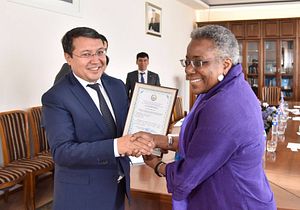For the first time in over a decade, a U.S.-based nongovernmental organization (NGO) has received accreditation to operate in Uzbekistan. American Councils for International Education (AC), an NGO that operates U.S. educational and exchange programs around the world, has become the first U.S. NGO to be registered in Uzbekistan since at least 2006.
On August 29, U.S. State Department spokesperson Heather Nauert announced that earlier in the day U.S. Ambassador to Uzbekistan Pamela Spratlen had “joined the deputy justice minister of Uzbekistan to welcome the American Councils for International Education to Uzbekistan.”
Nauert commented that it “demonstrates our growing strategic partnership between the United States and Uzbekistan, and the Government of Uzbekistan’s commitment to meaningful reform and international engagement.” She also highlighted the possibility for strengthening “people-to-people” ties and opening academic and cultural exchange opportunities between the two countries.
Speaking with The Diplomat, American Councils Executive Vice President David Patton says it’s not surprising that the organization is re-engaging in Uzbekistan.
“Uzbekistan has a very strong tradition in education, a young population, and a president who seems very focused on improving education, modernizing education, so in some ways it’s not terribly surprising,” he says.
AC already operates to varying degrees in Kazakhstan, Kyrgyzstan, Tajikistan, and Turkmenistan. Turkmenistan allows AC to operate in the country, albeit with specific restrictions, while the organization’s programs with Kazakhstan and Kyrgyzstan, in particular, are much more prominent. Patton says AC’s re-engagement with Uzbekistan will likely follow the latter model and that the organization has talked at length with its Uzbek partners about their educational roadmap. “With regard to international education,” Patton says, “I can say it’s extremely ambitious and broad.”
One of AC’s most popular programs is the Future Leaders Exchange (FLEX), which provides scholarships for regional high school students to spend a year living with an American family and attending an American high school. But Patton says there is interest in a range of programs from university partnerships to teacher training, from STEM subjects to English-language learning and much more.
AC opened an office in Uzbekistan in 1995 but was forced out in 2006. In 2006, the Andijan massacre and ensuing U.S. criticism of Uzbekistan’s human rights record led to a rupture in the bilateral relationship, and saw a number of international NGOs and media organizations kicked out of the country.
But, as Patton told The Diplomat, despite a “rough patch” in 2005-2006 the organization continued to have cordial contacts with Uzbekistan in the interim.
AC’s pending registration was mentioned earlier this year when Uzbek President Shavkat Mirziyoyev made his first state visit to the United States, the first state visit by an Uzbek president since Islam Karimov in 2002. Mirziyoyev’s visit, per the White House, “usher[ed] in a new era of strategic partnership between the United States and Uzbekistan.” In a briefing statement summarizing the visit, the White House noted that in their meetings, “The presidents welcomed the pending accreditation of the American Councils for International Education in Uzbekistan, which will contribute to educational cooperation between the two countries.”
Even earlier, when Mirziyoyev traveled to New York City for the UN General Assembly in late September 2017, in remarks delivered at a subsequent U.S.-Uzbekistan Business Forum, the Uzbek president “noted his desire for collaboration between American Councils, the Uzbek Ministry of Higher Education, and the Uzbek Chamber of Commerce and Industry.”
AC’s return to Uzbekistan, Patton says, was nevertheless much longer in the making: “We’ve been talking about this not just for a year, but for 12 years.”
While AC’s registration was warmly welcomed by regional watchers and follows similar measures, such as the accreditation of a Voice of America journalist earlier this year, it remains a fairly safe step.
As Human Rights Watch researcher Steven Swerdlow commented on Twitter, “Yes, good news. Let’s hope this sets a trend, including overturning earlier Supreme Court decisions which still prevent registration by human rights NGOs such as @hrw and @freedomhouse.”
Uzbekistan’s progress — in terms of regional and international engagement, at least — since Islam Karimov’s death in early September 2016 is measurable. Uzbekistan has walked back some of its most bullheaded positions, as evidenced by renewed engagement with Kyrgyzstan and Tajikistan and increased attention to the country’s relationship with Afghanistan. While Tashkent has not moved as far or as quickly with regard to political reforms or human rights issues, it has opened the door for human rights organizations and media in a way that was unfathomable in post-Andijan Uzbek relations with the West.
Tashkent’s engagement efforts — even with the state’s heaviest critics — are significant, but typified by caution. While delegations from organizations like Human Rights Watch and Amnesty International have been allowed to visit Uzbekistan in the past year, their official in-country registrations remain in limbo.

































